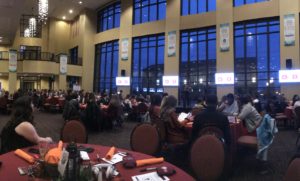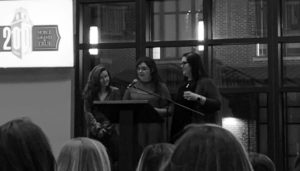The Robert Burns tradition at Maryville College

A Robert Burns dinner (or supper) is held annually on or around Jan. 25 to celebrate the life and works of Scottish poet Robert Burns (1759-1796). Scots and Scots-at-heart have been gathering annually since 1801 for a traditional Burns supper, where the poet’s famous verses are matched with Scottish food and Scotch whisky.
The tradition was celebrated for the first time at Maryville College on Jan. 25, 1992 and was called “Robert Burns Night.” It was held in the House in the Woods and included a Scottish bagpiper, poetry readings, and Scottish food.
According to a Dec. 9, 1991 Highland Echo article, the tradition at Maryville College was started by Lew Rudisill, the former director of conferences and special programs who oversaw the College’s non-credit programs for the campus and local community. The non-credit courses for Jan. 1992 included two workshop courses, including “Poetry of the Highlands” and “Foods of Scotland,” both of which culminated in Robert Burns Night.

up the lads’ roast and toast with one of their own.
The “Poetry of the Highlands” course was taught by Dave Powell ’66, former instructor of English at MC, and included a study of Burns’ poetry.
The “Foods of Scotland” class, which was taught by Chef Joseph Lowery, concentrated on traditional Scottish foods that would be served during the Robert Burns dinner. The first course focused on appetizers: green pea and salmon terrine, Scotch eggs and Aberdeen Angus pie. The second class focused on Cock-a-leekie soup and the main dish, Haggis with neeps and tatties. The third class focused on desserts, including shortbread, trifle and Scottish breads.
Rudisill was quoted in the 1991 Highland Echo article, saying she hoped the celebration would become an annual affair because of the College’s location and ties to Scotland.
“We don’t have any opportunities to celebrate our heritage at Maryville College,” Rudisill said. “We’re the Fighting Scots and the Highlanders, and we don’t have a festival or celebration of any kind of why we are called that.”
The College’s Office of Student Development took over the event in the mid- 1990s, when Bill Seymour became dean of students. After Vandy Kemp became vice president and dean of students in 2004, she decided to make a few changes. She replaced the cheap wine and blended Scotch that had been served in the past and instead served single malt Scotch, accompanied by a lecture. (Note: alcohol is only served to students who are 21 and older.)
“I knew from my own Scots-Irish heritage that the making of Scotch whisky or wiscobah (‘water of life’) is an ancient, honored and exacting process involving water, toasted barley grain and sugar,” Kemp continued. “I wanted the students to learn the history of the process and the difference between a fine single malt and a wretched blend that mixes up all the inferior leftovers. So, as dean, I personally led them through a proper tasting, with explanation, examination, smell and taste. To my delight, the students responded by not throwing back their shot but lingering over it, the proper way!”
In recent years, the College’s Student Programming Board has planned the annual event, including the 2019 event, which was held on Jan. 28 in the Clayton Center for the Arts’ William Baxter Lee III Grand Foyer. The event served as the student kick-off for the College’s bicentennial celebration and included an authentic Scottish meal (including Haggis), bagpipes, poetry and Scottish dancing.
Maryville College junior Alyssa Miller ’20, who serves as the traditions team leader for MC’s Student Programming Board, was involved with planning the 2019 event. She said she enjoys the event because “it’s different than any other event on campus.”
“It’s a formal event, which is so fun to be able to dress up and enjoy a nice meal and get to mingle with other students, as well as staff,” said Miller, who is majoring in child development and learning. “I think this is a cool tradition at Maryville College because of the ties to our Scottish heritage and remembering that is key to who we are. This event was the kick-off for our bicentennial year, so that in itself is exciting!”
